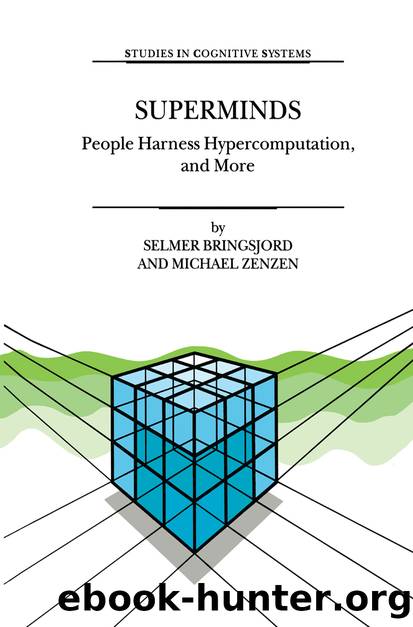Superminds by Selmer Bringsjord & Michael Zenzen

Author:Selmer Bringsjord & Michael Zenzen
Language: eng
Format: epub
Publisher: Springer Science+Business Media Dordrecht 2003
Published: 2015-03-15T16:00:00+00:00
CAT2Arguments against CT itself; and
CAT3Arguments against doctrines (e.g., the computational conception of mind) which are said to presuppose CT.
Consider CAT3 first. Perhaps the most promising argument in this category runs as follows. Assume for the sake of argument that all human cognition consists in the execution of effective processes (in brains, perhaps). It would then follow by CT that such processes are Turing-computable, i.e., that computationalism is true. However, if computationalism is false, while there remains incontrovertible evidence that human cognition consists in the execution of effective processes, CT is overthrown.
Attacks of this sort strike us as decidedly unpromising. For starters, many people aren’t persuaded that computationalism is false (despite the many careful arguments we have ourselves given; recall Table 1). Secondly, this argument silently presupposes some sort of physicalism, because the evidence for the effectiveness of cognition (in the sense that all cognition is effective; only this view can support an overthrow of CT in CAT3) no doubt derives from observation and study of processes in the central nervous system. Thirdly, it is certainly at least an open question as to whether the processes involved are effective. Indeed, by our lights, some of the processes that constitute cognition aren’t effective. We are after all in the business of demonstrating this.
What about CAT1? Well, our refutation of Mendelson falls within it — and yet who would claim that what we have revealed about Mendelson’s reasoning constitutes, by itself, a serious attack on CT? The same fundamental question derails even the work of those who intend to attack CT by attacking the time-honored rationales for it. For example, William Thomas (1973) seeks to capitalize on the fact (and it is a fact, that much is uncontroversial) that the main rationale behind CT involves empirical induction — a form of reasoning that has little standing in mathematics. Unfortunately, Thomas’ observations don’t threaten CT in the least, as is easy to see. Most of us believe, unshakably believe, that the universe is more than 3 seconds old — but what mathematical rationale have we for this belief? As Russell pointed out, mathematics is quite consistent with the proposition that the universe popped into existence 3 seconds ago, replete not only with stars, but with light here on Earth from stars, and also with minds whose memories include those we have. More generally, of course, from the fact that p doesn’t follow deductively from a set of propositions Г, it hardly follows that p is false; it doesn’t even follow that p is the slightest bit implausible.
We are left, then, with CAT2 — the category into which our own attack on CT falls. How does Arg3 compare with other attacks in this category? To support the view that our own attack is superior, let us consider a notorious argument from four decades back, one due to László Kalmár (1959) (and rejected by none other than Elliott Mendelson 1963), and the only other modern attack on CT that we know of, one given by Carol Cleland (1993, 1995).
Download
This site does not store any files on its server. We only index and link to content provided by other sites. Please contact the content providers to delete copyright contents if any and email us, we'll remove relevant links or contents immediately.
Algorithms of the Intelligent Web by Haralambos Marmanis;Dmitry Babenko(17576)
Jquery UI in Action : Master the concepts Of Jquery UI: A Step By Step Approach by ANMOL GOYAL(10029)
Test-Driven Development with Java by Alan Mellor(7751)
Data Augmentation with Python by Duc Haba(7625)
Principles of Data Fabric by Sonia Mezzetta(7398)
Learn Blender Simulations the Right Way by Stephen Pearson(7307)
Microservices with Spring Boot 3 and Spring Cloud by Magnus Larsson(7156)
Hadoop in Practice by Alex Holmes(6693)
RPA Solution Architect's Handbook by Sachin Sahgal(6532)
The Infinite Retina by Robert Scoble Irena Cronin(6235)
Big Data Analysis with Python by Ivan Marin(5956)
Life 3.0: Being Human in the Age of Artificial Intelligence by Tegmark Max(5539)
Pretrain Vision and Large Language Models in Python by Emily Webber(4915)
Infrastructure as Code for Beginners by Russ McKendrick(4670)
Functional Programming in JavaScript by Mantyla Dan(4508)
WordPress Plugin Development Cookbook by Yannick Lefebvre(4406)
The Age of Surveillance Capitalism by Shoshana Zuboff(4272)
Embracing Microservices Design by Ovais Mehboob Ahmed Khan Nabil Siddiqui and Timothy Oleson(4160)
Applied Machine Learning for Healthcare and Life Sciences Using AWS by Ujjwal Ratan(4151)
